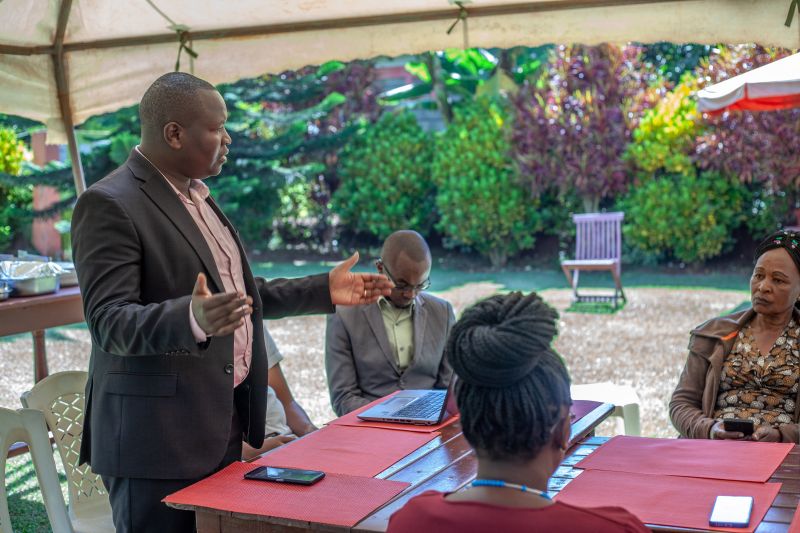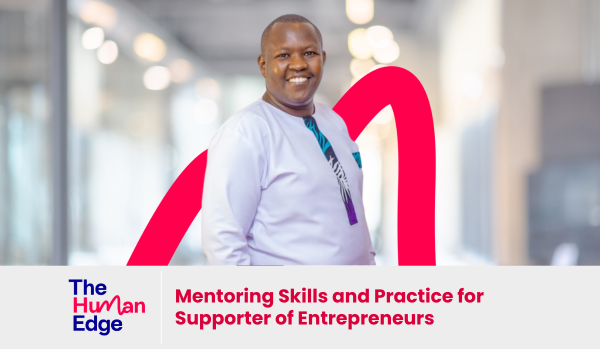James Gachiri has always believed in the power of entrepreneurship to drive economic growth. As the Executive Director of Dimewise in Kenya, he’s on a mission to empower micro-entrepreneurs – particularly women and youth – with the skills and resources they need to not just survive, but thrive. Overseeing programmes that provide access to finance, capacity building and digital solutions to over 10,000 entrepreneurs across six counties, James is deeply invested in nurturing economic growth through entrepreneurship.
Mentoring has always been a part of Dimewise’s capacity-building efforts. But for James, it was largely an intuitive process, drawing on personal business experience and lessons learned from his own entrepreneurial journey. He felt a strong desire to elevate their approach, to build a more structured, scalable and impactful mentoring programme. When he discovered The Human Edge’s Mentoring Skills and Practice (MSP) programme, he knew it was the catalyst he was looking for. “I had been mentoring based on natural experience,” James explains, “but I wanted to develop the right skills – ones that would help me mentor more effectively and share knowledge in a structured way with my team and the entrepreneurs we support.”
James entered the programme expecting to gain practical tools and techniques. What he didn’t anticipate was the profound shift in his perspective on mentoring itself. “Initially,” he admits, “I thought mentoring was about providing solutions – giving entrepreneurs the answers to their challenges. But the programme helped me realise that my role is to guide them, not direct them.”
Through the training, James was introduced to the OSCAR model and other structured mentoring tools, which empowered him to ask more insightful questions, facilitate deeper, more meaningful conversations and ultimately, empower mentees to make their own informed decisions. This was a true breakthrough. “As a mentor,” he explains, “you’re not there forever. Your job is to equip entrepreneurs with the confidence and capacity to think critically and solve problems independently. When they own their decisions, they are far more committed to their journey.”
James immediately put his new skills into action with an entrepreneur in the automotive sector. This entrepreneur was at a critical crossroads, unsure whether to expand her business, adopt new technology, or hold back due to anxieties about taxation and financial risk. Before the training, James might have offered direct advice. Instead, he used the questioning techniques and scenario analysis he had learned to guide her through her own decision-making process. Together, they explored the key challenges, broke them down into manageable steps and systematically addressed her fears. “We took it one step at a time,” James recalls, “helping her see the opportunities and risks clearly. By the end of our conversations, she had the confidence to formally register her business, open a second branch and hire three additional mechanics and a shop attendant. She even integrated a point-of-sale system to improve her financial tracking.”
This fundamental shift – from providing answers to facilitating growth – has been the most significant transformation in James’s mentoring approach.
Beyond his direct mentoring work, James has leveraged the programme’s learnings to strengthen Dimewise’s entire mentoring framework. He designed a formal mentoring programme and trained his business development officers, equipping them with the same powerful tools and techniques he had learned. “I wanted to make sure mentoring wasn’t just something I was doing,” he emphasises. “I wanted it to be embedded in our organisation’s DNA.”
To effectively scale mentoring across Dimewise’s vast network of 10,000 entrepreneurs, James and his team implemented a multi-pronged approach:
- Empowering Mentors: They trained business development officers to serve as mentors, significantly expanding their reach and capacity to support entrepreneurs.
- Integrating Mentoring: They seamlessly integrated mentoring techniques into their accelerator and incubator programmes, ensuring structured guidance at every stage of the entrepreneurial journey.
- Localising Tools: They tailored mentoring tools to local contexts, translating them into local dialects and adapting them for entrepreneurs with varying literacy levels, ensuring inclusivity and accessibility.
- Fostering Peer Learning: They facilitated peer learning groups, encouraging entrepreneurs to observe and learn from each other’s experiences, creating a powerful network of support. “Some entrepreneurs feel that things like technology or structured systems are too expensive or out of reach,” James explains. “But when they see their peers using them successfully, it sparks curiosity and shifts their mindset.”
The training didn’t just transform how James mentors; it also refined his leadership approach. Today, he fosters a collaborative environment where his team is encouraged to innovate and make decisions independently. “I used to feel that I needed to have all the answers,” he explains. “Now, I focus on empowering my team to discover their own solutions. I’ve seen them become more proactive and creative, confidently taking the initiative.”
By empowering his team, he has witnessed a remarkable increase in their confidence and independence, creating a stronger, more self-sufficient organisation.
James recognises mentoring as an essential pillar of entrepreneurship development. While Dimewise currently offers mentoring as a free service, the organisation is exploring ways to expand its mentoring programmes, ensuring long-term sustainability. “We’re building capacity within our team,” he explains, “refining our tools and ensuring we’re offering high-quality mentoring. Once we have that solid foundation, we can explore offering structured mentoring services beyond our current network.”
Beyond Dimewise, James is also contributing to building a larger mentoring ecosystem in Africa. Through connections made during the programme, he is collaborating with other ESOs to establish an African mentoring association, creating a network of trained mentors who can share knowledge, resources and best practices.
For James, the MSP programme has far exceeded his initial expectations. He is already enthusiastically encouraging his team and other ESOs to participate. “This programme formalised my mentoring approach,” he emphasises, “gave me practical tools and helped me scale mentoring across my organisation. I would absolutely recommend it to anyone supporting entrepreneurs – it’s one of the best investments you can make in your own development.”
With a clearer vision, structured tools and a growing network of mentors, James Gachiri is not just supporting entrepreneurs; he’s empowering them, one mentor, one mentee, one thriving business at a time.

James took part in the Mentoring Skills and Practice for Supporter of Entrepreneurs Course in September 2024. The programme involved 123 mentors from 16 countries across SSA and MENA. For more details on the Mentoring Skills and Practice Course, click here.

